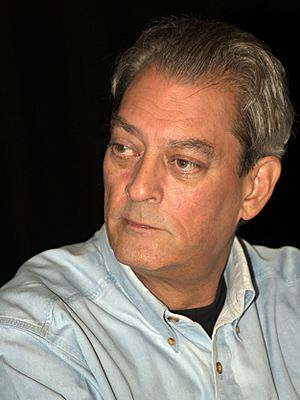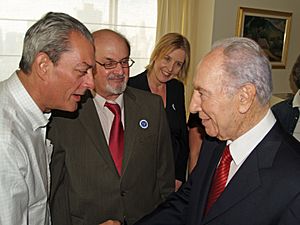Paul Auster facts for kids
Quick facts for kids
Paul Auster
|
|
|---|---|

Auster in 2010
|
|
| Born | Paul Benjamin Auster February 3, 1947 Newark, New Jersey, U.S. |
| Died | April 30, 2024 (aged 77) New York City, U.S. |
| Pen name | Paul Benjamin |
| Occupation |
|
| Alma mater | Columbia University (BA, MA) |
| Period | 1974–2023 |
| Genre | Poetry, literary fiction |
| Spouse | |
| Children | 2, including Sophie Auster |
| Signature | |
 |
|
Paul Benjamin Auster (born February 3, 1947 – died April 30, 2024) was an American writer and film director. He wrote many popular books that have been translated into over 40 languages. Some of his most famous works include The New York Trilogy (1987), Moon Palace (1989), The Music of Chance (1990), and 4 3 2 1 (2017).
Contents
Early Life and Education
Paul Auster was born in Newark, New Jersey. His parents, Queenie and Samuel Auster, were from a middle-class Jewish family with roots in Austria. He grew up in South Orange, New Jersey, and Newark. He finished high school at Columbia High School in Maplewood.
After high school, Paul Auster went to Columbia University. He earned both his bachelor's and master's degrees there in 1970.
Writing Career
After college, Paul Auster moved to Paris, France. He worked there as a translator, turning French books into English. He also took on other jobs to make a living.
When he returned to the United States in 1974, he started publishing his own work. He wrote poems, essays, and novels. He also continued to translate books by French writers like Stéphane Mallarmé.
Paul Auster became well-known after his first memoir, The Invention of Solitude. He then gained more fame for a group of three stories called The New York Trilogy. These books might seem like detective stories, but they are different. They explore big questions about who we are, where we belong, and how we use language. Auster used the detective style to make readers think deeply about these ideas. He once said that the Trilogy grew directly from The Invention of Solitude.
Many of Auster's later books also explored what it means to find your identity and purpose. He often wrote about how chance and random events can change lives, like in The Music of Chance. He also looked at how people relate to each other and their surroundings, as seen in The Book of Illusions and Moon Palace. Often, his characters find themselves caught up in other people's mysterious plans.
In 1995, Auster wrote and helped direct two films: Smoke and Blue in the Face. Smoke even won him an award for best first screenplay. His more recent books, like Oracle Night (2003) and 4 3 2 1 (2017), were also very popular with critics.
From 2004 to 2009, he was on the board of a group called the PEN American Center. This group works to protect writers' freedom of speech. He was also a vice president from 2005 to 2007.
In 2012, Auster said he would not visit Turkey. He did this to protest how Turkey treated journalists. The Turkish Prime Minister, Recep Tayyip Erdoğan, replied, "As if we need you! Who cares if you come, or not?" Auster answered by pointing out that many writers were in prison in Turkey.
One of Auster's books, A Life in Words, was published in 2017. It was a collection of conversations he had with a Danish scholar named I.B. Siegumfeldt. They talked about all of Auster's books, both fiction and non-fiction. This book helps readers understand how Auster thought about his own writing.
Paul Auster allowed Iranian translators to create Persian versions of his books for a small fee. This was important because Iran does not follow international copyright laws.
Common Themes in Auster's Books
Paul Auster's stories often explore certain ideas. Here are some of the things you might find in his books:
- Coincidence: Events that happen by chance.
- Simple Living: Characters who live without many luxuries.
- Feeling of Danger: A sense that something bad is about to happen.
- Writers as Main Characters: Often, the main character or narrator is a writer who thinks a lot about their stories.
- Losing Understanding: Characters who struggle to make sense of things.
- Losing Words: Characters who have trouble speaking or expressing themselves.
- Losing Money: Characters who start with a lot but slowly lose it all.
- Everyday Life: Stories that show the details of normal, daily life.
- Failure: Characters who face setbacks and don't always succeed.
- Absent Fathers: Stories where a father figure is missing or not present.
- Writing and Storytelling: Books that are about the act of writing itself, or stories that connect to other books and ideas.
- American History and Places: Stories that often take place in America and touch on its past.
Personal Life and Death
Paul Auster was married to writer Lydia Davis. They had one son named Daniel Auster.
Later, he married another writer, Siri Hustvedt, in 1981. They lived in Brooklyn, New York. Together, they had a daughter named Sophie Auster, who became a singer.
In March 2023, Siri Hustvedt shared that Paul Auster had been diagnosed with cancer. He had been receiving treatment in New York. Paul Auster passed away from complications of lung cancer at his home in Brooklyn on April 30, 2024. He was 77 years old.
Awards and Recognition
Paul Auster received many awards for his writing throughout his career. Some of these include:
- 1989 Prix France Culture de Littérature Étrangère
- 1990 Morton Dauwen Zabel Award from the American Academy of Arts and Letters
- 1993 Prix Médicis Étranger for Leviathan
- 1995 Independent Spirit award for best first screenplay for Smoke
- 2003 Fellow of the American Academy of Arts and Sciences
- 2006 Prince of Asturias Award for Literature
- 2006 Elected to the American Academy of Arts and Letters
- 2007 Commandeur de l'Ordre des Arts et des Lettres (a French honor)
- 2017 Booker Prize Shortlist for "4321"
Published Works
Paul Auster wrote many different kinds of books. Here are some of his most well-known works:
Fiction Books
- Squeeze Play (1984) (written under the name Paul Benjamin)
- The New York Trilogy (1987)
- City of Glass (1985)
- Ghosts (1986)
- The Locked Room (1986)
- In the Country of Last Things (1987)
- Moon Palace (1989)
- The Music of Chance (1990)
- Leviathan (1992)
- Mr. Vertigo (1994)
- Timbuktu (1999)
- The Book of Illusions (2002)
- Oracle Night (2003)
- The Brooklyn Follies (2005)
- Travels in the Scriptorium (2006)
- Man in the Dark (2008)
- Invisible (2009)
- Sunset Park (2010)
- Day/Night (2013)
- 4 3 2 1 (2017)
- Baumgartner (2023)
Nonfiction Books
- The Invention of Solitude (1982)
- The Art of Hunger (1992)
- The Red Notebook (1995)
- Hand to Mouth (1997)
- Winter Journal (2012)
- Here and Now: Letters, 2008–2011 (2013) (letters with J. M. Coetzee)
- Report from the Interior (2013)
- A Life in Words: In Conversation with I. B. Siegumfeldt (2017)
- Burning Boy: The Life and Work of Stephen Crane (2021)
Poetry Books
- Unearth (1974)
- Wall Writing (1976)
- Fragments from the Cold (1977)
- Facing the Music (1980)
- Disappearances: Selected Poems (1988)
- Collected Poems (2007)
Screenplays (Movies he Wrote)
- Smoke (1995)
- Blue in the Face (1995)
- Lulu on the Bridge (1998)
- The Inner Life of Martin Frost (2007)
Translations (Books he Translated)
- Fits and Starts: Selected Poems of Jacques Dupin (1974)
- The Uninhabited: Selected Poems of André du Bouchet (1976)
- Life/Situations, by Jean-Paul Sartre (1977)
- A Tomb for Anatole, by Stéphane Mallarmé (1983)
- Chronicle of the Guayaki Indians (1998)
- The Notebooks of Joseph Joubert (2005)
Other Media and Adaptations
Paul Auster's work has appeared in many other forms, including movies, graphic novels, and music.
- In 1993, his book The Music of Chance was made into a movie. Paul Auster even had a small role in it.
- His book City of Glass was turned into a graphic novel in 1994.
- From 1999 to 2001, Auster was part of NPR's National Story Project. He would read true stories sent in by listeners on the radio.
- His voice was used in a 2004 audio guide called "Ground Zero."
- In 2005, his daughter, Sophie Auster, released an album. Paul Auster wrote the lyrics for three of the songs.
- In 2006, Auster directed a film called The Inner Life of Martin Frost, which he also wrote. His daughter Sophie acted in it.
- His books have also inspired other artists, like the musician Fionn Regan and the film director Pedro Almodovar.
Images for kids
See also
 In Spanish: Paul Auster para niños
In Spanish: Paul Auster para niños
 | Precious Adams |
 | Lauren Anderson |
 | Janet Collins |



